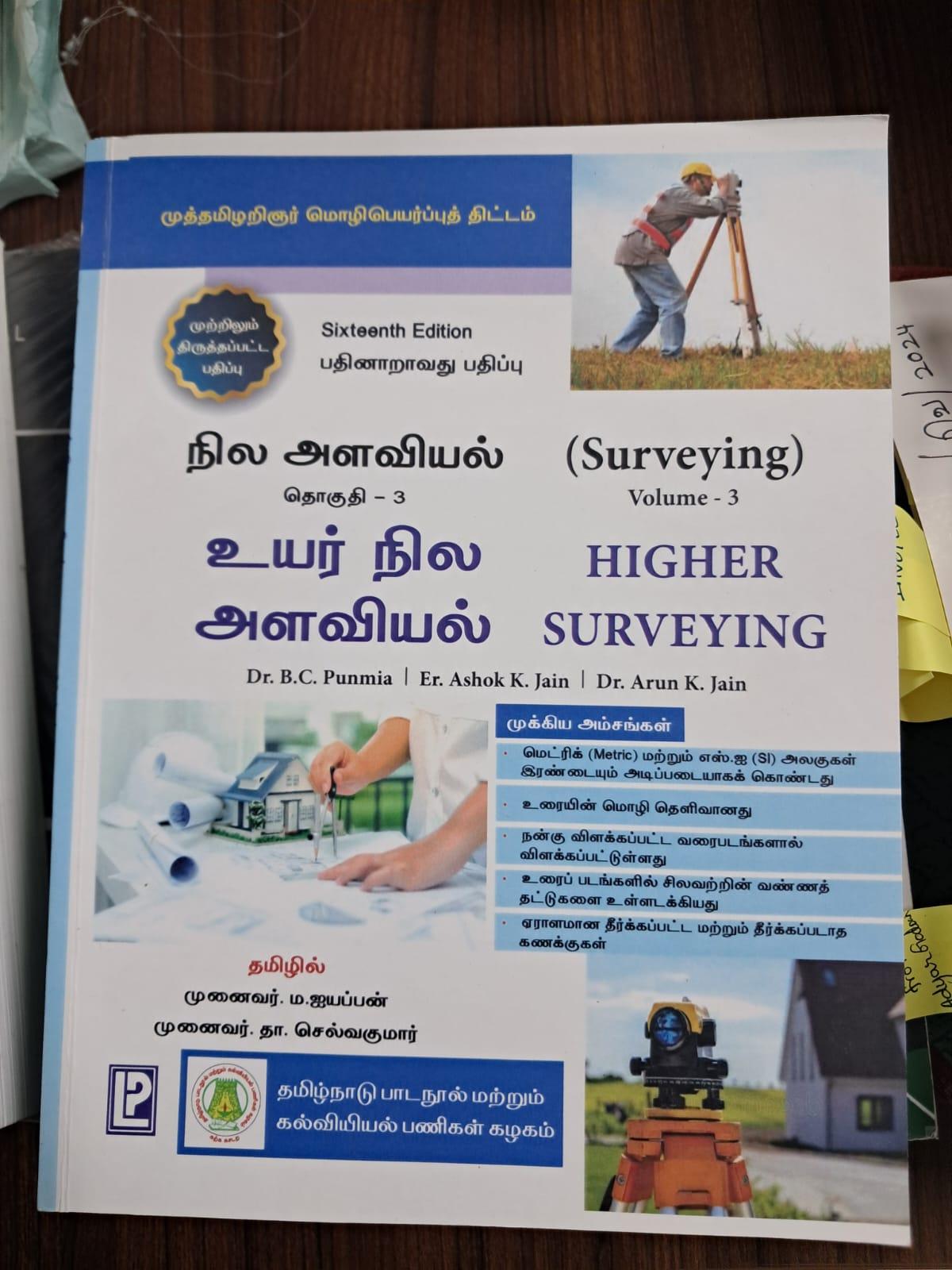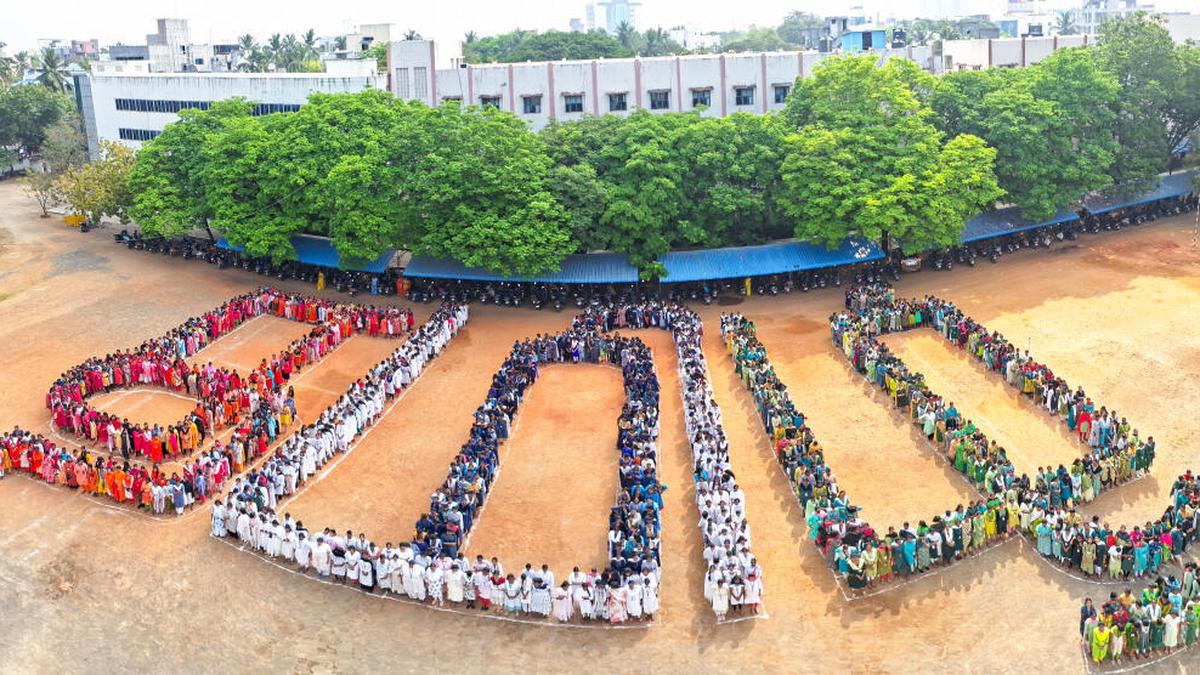The translation initiative has so far has published 875 books and sold books worth ₹6 crore. In photo, college students form a human chain in the form of ‘Tamil’ to express their love for their mother tongue. | Photo: ANI
Tamil achieved the distinction of being the first South Asian language to have the Guyton and Hall Textbook of Medical Physiology, which is treated as a Bible by medical students worldwide. Another feat is the publication of of the Tamil translation of Gray’s Anatomy, a student-friendly, clinically oriented textbook on Human Anatomy.
Like any achievement, this didn’t happen overnight. The State has consistently invested in translating textbooks across domains for many years. While everyone lauds the efforts, some experts say studying medicine in a regional language can curtail a student’s chances to move globally.
These textbooks are published by the Tamil Nadu Text Book and Educational Services Corporation (TNTBESC), a state-owned body set up by late Chief Minister M. Karunanidhi. He expanded the scope of the TNTBESC by establishing a section for translating books for college students. It was to aid the State’s move to introduce Tamil as the medium of instruction in Arts and Science colleges in the 1960s. “We have so far published 875 books and sold books worth ₹6 crore,” said T.S. Saravanan, Joint Director, Translation, TNTBESC.
Textbook translations across domains
The TNTBESC has taken up the translation of books on every branch of medicine. It is working across subjects such as Pharmacology, Dermatology, Gynaecology, Surgery, Biochemistry, Parasitology, Forensic Medicine Drug Design, Parson’s diseases of Eyes and others.
The translation efforts, however, are not just confined to medical textbooks. For students of Commerce and Management, the TNTBESC has already translated and published Philip Kotler’s Marketing Management. It has similarly published Surveying and Higher Surveying for Civil Engineering students, Automobile Engineering for Mechanical Engineering students, books on Hydrology, textbooks on Transportation Engineering, Textile Technology, Physics, Chemistry, Botany, Literature, and many books on History and other subjects for students joining professional courses and competitive examinations.
A boon for civil service aspirants
Once civil servants were allowed to write in their mother tongue, books on various subjects in Tamil and translated books proved to be a treasure. Mr. Saravanan from the TNTBESC recalled how a book on World History by Bhaktavastalu in Tamil had benefitted an IAS officer to clear his examinations. Similarly, the two-volume book on the History of Greece continues to remain a bestseller.

The translation efforts are not just confined to medical textbooks. | Photo: Special Arrangement
These translations also benefit Tamil medium students who secure admission to higher education institutes. Mr. Saravanan, recalling the difficulties faced by his batchmates in veterinary college, says that a lot of them fail in subjects because of their inability to switch to the English medium of instruction. This need for translated books further increased after the government introduced 7.5 per cent reservation for government school students. In 2020, the Tamil Nadu government reserved 7.5% seats in undergraduate medical admissions for government-school students who qualified NEET. “There is a need for books in Tamil that will act as a bridge for students of Tamil medium” said Mr. Saravanan.
Mr. Saravanan said the government constituted a committee of 50 experts to translate and oversee the projects. The government initially sanctioned ₹5 crore for the project and has increased it to ₹10 crore. Medical books are translated by doctors, who are at ease with English and Tamil. “The works are also constantly reviewed to achieve perfection,” he said.
A surgeon at the government medical college said right now translated books were a dire necessity. He also explained the difficulties in translating medical texts. “We can translate basic and established textbooks without difficulty. But doubling time and keeping pace with rapid advances and the need to translate academic journals and research papers periodically will be difficult. Artificial intelligence can help us in this regard,” said the surgeon.
Not all in support
However, not all medical professionals are on-board with this translation project. Psychiatrist Sivabalan Elangovan says studying medicine in a regional language curtails students’ chances to move globally. He believes life-long learning is essential in the field of Medicine and English is essential to update with global evidence. “I am against it. Though a lot of us studied in Tamil medium, we never felt it difficult to study medical textbooks in English,” says Mr. Elangovan.
Some professionals take the middle ground. A nephrologist at a government medical college said books on Tamil were necessary, but the medium of instruction should never be changed to Tamil. “It would severely affect students’ ability to update their knowledge”, said the nephrologist.
Access over profits
Experts reflect on the need for translated medical textbooks in light of the introduction of NEET as the entrance. The nephrologist says that before NEET, medical education remained inclusive to all sections of the society. After NEET, the demographic of medical students includes either urban elites who can afford coaching or rural students who make it to medical college through the 7.5 percent reservation. “Students from rural areas badly need books to understand the subjects in the beginning. The translated books will serve like study guides. A lot of students would fail because of their inability to understand English. But all of them gained adequate knowledge in the third year,” said the nephrologist.
Mr. Saravanan said a language should be constantly enriched by the translation of books. To support his argument he recalled an incident that took place during the release of the 600th book by the Corporation in 1976. It was when the director of the corporation (then it was a society) lamented that they could not sell books even beyond ₹2 lakh, Mr. Karunanidhi said the director should be happy that the state had published 600 books, while other States were lagging far behind. He recalled Karunanidhi saying, “We should be happy that we have sold at least for ₹2 lakh. Profit alone is not the motto. Access to knowledge prevails over all other considerations”.
Published – March 04, 2025 05:00 pm IST
